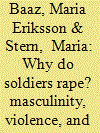| Srl | Item |
| 1 |
ID:
082099


|
|
|
|
|
| Publication |
2008.
|
| Summary/Abstract |
During the last years the DRC has made itself known in the world for terrible acts of violence committed by armed men - militia and the regular army - against the civilian population. The voices of the soldiers and combatants have so far been absent in the accounts of this violence. This silence is problematic, both because it makes it harder to understand such violence, but also because it reinforces stereotypes of African warriors as primitive and anarchic, driven by innate violence and tribal hatred. Enquiry into the particular discursive as well as material circumstances of the armed conflict in the DRC, which might better redress the complex and interrelated context in which 'people in uniforms' commit violence, is consequently impeded. The story we recount here emerges from soldiers within the main perpetrator of violence in the DRC today: the Integrated Armed Forces. The soldiers' interview texts challenge the dominant representation of soldiers and combatants in the DRC. The soldiers made sense of the prevalence of violence (in which they too had participated) in several interrelated ways, none of which reflected any expression of 'natural' (if dormant) violent tendencies, hatred or vengefulness for the enemy.
|
|
|
|
|
|
|
|
|
|
|
|
|
|
|
|
| 2 |
ID:
089048


|
|
|
|
|
| Publication |
2009.
|
| Summary/Abstract |
This article explores the ways soldiers in the Congo speak about the massive amount of rape committed by the armed forces in the recent war in the DRC. It focuses on the reasons that the soldiers give to why rape occurs. It discusses how the soldiers distinguish between "lust rapes" and "evil rapes" and argues that their explanations of rape must be understood in relation to notions of different (impossible) masculinities. Ultimately, through reading the soldiers' words, we can glimpse the logics-arguably informed by the increasingly globalized context of soldiering-through which rape becomes possible, and even "normalized" in particular warscapes.
|
|
|
|
|
|
|
|
|
|
|
|
|
|
|
|